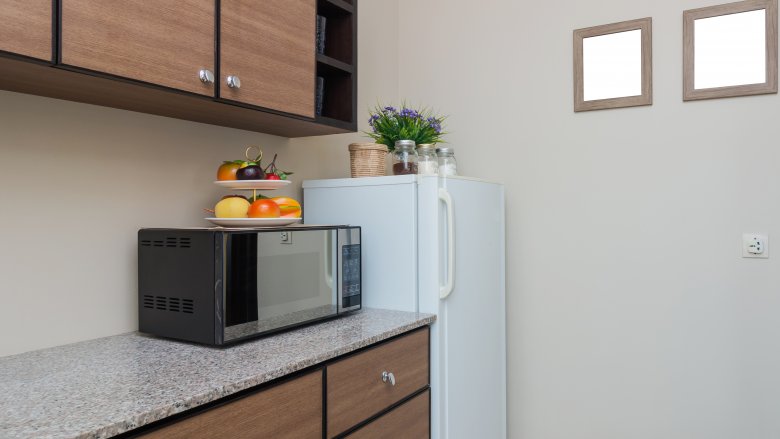One Of The Dirtiest Things In Your Office Kitchen Will Surprise You
Bad news for anyone who works in an office and uses the kitchen — the surfaces you'll encounter there are loaded with bacterial contamination, particularly the kind that's apt to make you sick. While some places in the kitchen won't surprise you (such as sink faucet handles), there are some startling surfaces you wouldn't think germs would lurk — but they actually do.
A study put together by Kimberly-Clark (via Cooking Light) showed that 5,000 swabs, taken at office buildings that host over 3,000 people, turned up a lot of gross stuff. Specifically, they counted the amount of adenosine triphosphate (ATP), which indicates contamination, and if the levels are found to be above 300, it's indicative of a high risk for illness transmission. Levels between 100 and 300 indicate there is room for improvement in cleaning.
In the study, they found an ATP count of 300 or more on the following surfaces: 75 percent of sink faucet handles in break rooms or office kitchens, 48 percent of microwave door handles, 27 percent of keyboards, 26 percent of refrigerator door handles, 23 percent of water fountain buttons, and 21 percent of vending machine buttons.
Pretty alarming, right? While the sink handles aren't too surprising (people use sinks to wash their dirty hands, after all), the contamination on the microwave oven door handles is pretty mind-blowing. They found that almost half of those they tested had enough contamination to transmit illness, and people use microwaves before doing what? Eating. Eating food with their now-filthy hands, thanks to that handle.
Other hot spots also involve food, such as refrigerator door handles, water fountain buttons, and vending machine buttons. Ew.
While it's vital to wash your hands constantly, particularly before eating, you might want to add "microwave and refrigerator door handles" to your office cleaning list, and make sure someone is doing it at least once a day. This doesn't mean they'll be perfect (you should still wash your hands), but if they're cleaned more often, that should cut down on their ATP count, which could keep you from getting sick.
